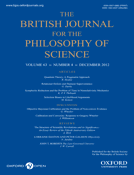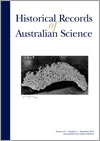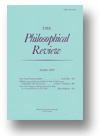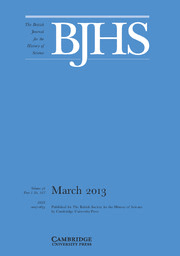
BRITISH JOURNAL FOR THE PHILOSOPHY OF SCIENCE
Scope & Guideline
Cultivating a Deeper Understanding of Scientific Practices
Introduction
Aims and Scopes
- Philosophical Foundations of Scientific Theories:
The journal publishes works that explore the conceptual underpinnings of scientific theories, examining how philosophical ideas shape scientific knowledge. - Methodological Analysis:
A significant focus is placed on the methodologies employed in scientific research, including discussions on the implications of various research methods and their philosophical interpretations. - Epistemology and Scientific Knowledge:
Papers often delve into issues surrounding the nature of scientific knowledge, including topics like objectivity, evidence, and the role of induction in scientific reasoning. - Interdisciplinary Approaches:
The journal encourages interdisciplinary studies that integrate insights from various fields such as biology, physics, psychology, and mathematics, fostering a comprehensive understanding of scientific practices. - Ethics and Social Implications of Science:
There is a growing emphasis on the ethical dimensions of scientific research, including discussions on topics like scientific fraud, racism in science, and the societal impacts of scientific advancements.
Trending and Emerging
- Quantum Theory and Interpretations:
There is a notable increase in works addressing quantum mechanics, including discussions on interpretations of quantum theory and its philosophical implications, showcasing the field's relevance to current scientific debates. - Epistemic Justice and Ethics in Science:
Emerging discussions surrounding epistemic justice reflect a growing concern for fairness and equity in scientific practices, emphasizing the social dimensions of knowledge production. - Causation and Mechanisms:
The study of causation, particularly in the context of mechanisms in biological and physical sciences, is gaining traction, highlighting the importance of understanding causal relationships in scientific explanations. - Statistical Models and Objectivity:
An increasing number of papers explore the role of statistical models in scientific reasoning, particularly concerning issues of objectivity and underdetermination, indicating a shift towards quantitative methodologies in philosophy of science. - Interdisciplinary Methodologies:
There is a trend towards employing interdisciplinary methodologies, with more papers integrating insights from various scientific disciplines, suggesting a collaborative approach to philosophical inquiries.
Declining or Waning
- Classical Mechanics and Traditional Physics:
Papers focusing solely on classical mechanics or traditional physics concepts have become less frequent, indicating a possible shift towards more contemporary or interdisciplinary frameworks. - Reductionism in Scientific Explanation:
The debate surrounding reductionism seems to be less prevalent, with fewer papers arguing for or against reductionist interpretations of complex systems in recent publications. - Historical Perspectives on Science:
While historical analyses were once a staple, there seems to be a decreasing number of submissions that focus on the history of scientific thought or historical case studies in science. - Philosophy of Mathematics:
The intersection of philosophy and mathematics has seen a decline, with fewer articles exploring mathematical philosophy as a standalone topic within the journal's scope. - Metaphysical Foundations of Science:
Discussions centered around metaphysical questions regarding the nature of scientific entities have become less common, possibly as the journal pivots towards more practical and empirical considerations.
Similar Journals

Metode Science Studies Journal
Unlocking the Complexities of Scientific PracticesMetode Science Studies Journal, published by UNIV VALENCIA, BOTANICAL GARDEN UV, is an esteemed open-access journal dedicated to advancing scholarly discourse in the fields of history and philosophy of science and multidisciplinary studies. Since its inception in 2013, the journal has positioned itself as a vital resource for researchers, professionals, and students, fostering an environment for innovative research and cross-disciplinary dialogue. Based in the vibrant city of Valencia, Spain, this journal aims to publish high-quality articles that explore the intricate relationships between scientific practices and philosophical inquiries. With a current impact factor demonstrating its relevance in the academic community, the journal is indexed in Scopus, ranking in the 52nd percentile for history and philosophy of science and the 33rd percentile for multidisciplinary studies. Scholars can access a breadth of research outputs that span from 2015 to 2024, thereby contributing significantly to the intellectual landscape of the respective fields.

SYNTHESE
Connecting minds through rigorous academic exploration.SYNTHESE is a prestigious academic journal published by Springer, renowned for its contributions to the fields of Philosophy and Social Sciences. With a distinguished history dating back to its inception in 1936, this journal continues to thrive, offering a platform for innovative and critical discourse. Recognized for its excellence, SYNTHESE holds a remarkable Q1 quartile ranking in both Philosophy and Social Sciences (miscellaneous) as of 2023, placing it within the top tier of scholarly publications. Its impressive Scopus rankings further underscore its influence, boasting a rank of #48 out of 806 in Philosophy and #70 out of 275 in General Social Sciences, thereby reflecting a 94th percentile in the arts and humanities. The journal's scope encompasses a wide array of interdisciplinary and philosophical inquiries, making it a vital resource for researchers, professionals, and students seeking to deepen their understanding of complex social issues. With access options that promote scholarly connectivity, SYNTHESE is committed to advancing knowledge and fostering intellectual engagement within the global academic community.

Historical Records of Australian Science
Preserving the Narrative of Scientific Progress.Historical Records of Australian Science is a premier academic journal published by CSIRO PUBLISHING, focusing on the rich legacy and contributions of Australian science from its inception to contemporary advancements. The journal is integral to the Arts and Humanities and Social Sciences fields, operating within a unique niche that fosters interdisciplinary dialogue and research. With its ISSN 0727-3061 and E-ISSN 1448-5508, it encompasses a diverse scope spanning historical analysis, philosophy of science, demography, and human factors. Although it is currently categorized into Q3 and Q4 quartiles across various relevant spheres in 2023, the journal strives for excellence in archiving pivotal scientific milestones as it continues to publish valuable insights, encouraging submissions from scholars globally. Its commitment to enriching scholarly discussion makes it a crucial resource for researchers, professionals, and students keen on exploring the historical narratives that have shaped Australia’s scientific landscape. With a convergence of knowledge from 1980 through to 2024, the Historical Records of Australian Science stands as a vital repository for those delving into Australia’s scientific heritage.

HISTORY AND PHILOSOPHY OF THE LIFE SCIENCES
Connecting Historical Contexts with Philosophical Inquiry in Life SciencesHISTORY AND PHILOSOPHY OF THE LIFE SCIENCES, published by SPRINGER INT PUBL AG, stands as a leading peer-reviewed journal dedicated to exploring the intricate relationships between historical narratives and philosophical frameworks in the life sciences. With its robust impact factor and recognized position as a Q1 journal in key categories such as Arts and Humanities, History, and History and Philosophy of Science, this journal provides a vital platform for researchers, professionals, and students seeking to delve into the theoretical underpinnings and historical trajectories shaping contemporary life sciences. Established in 1979 and evolving through its converged years until 2024, it reflects the journal's enduring commitment to advancing scholarly discourse in its field. While the journal is not open access, it nonetheless attracts a diverse readership, facilitating meaningful research exchanges and interdisciplinary dialogues. Located in the picturesque country of Switzerland, the journal invites contributions that foster critical examination and innovative thinking in the historiography and philosophy of life sciences, ultimately enhancing our understanding of this dynamic and significant discipline.

Journal for General Philosophy of Science
Shaping the Future of Philosophical Discourse in ScienceJournal for General Philosophy of Science, published by Springer, stands as a pivotal resource in the fields of History and Philosophy of Science, as well as general Philosophy. With an impressive Q1 ranking in its categories and a solid reputation reflected in its Scopus rankings, this journal provides a robust platform for scholarly discourse and advancement in philosophical inquiry regarding science. The journal's commitment to quality is evident, catering to researchers, professionals, and students interested in the critical examination of scientific methods, theories, and their implications. While it operates on a subscription basis, the journal is dedicated to fostering a deeper understanding of philosophical issues surrounding scientific practices from 1980 through 2024. Operating out of the picturesque Netherlands, specifically from VAN GODEWIJCKSTRAAT 30, 3311 GZ DORDRECHT, the journal continues to encourage innovative thinking and interdisciplinary dialogue, underscoring its significance in academia today.

PHILOSOPHICAL REVIEW
Pioneering Insights in PhilosophyPHILOSOPHICAL REVIEW, published by DUKE UNIVERSITY PRESS, is a leading academic journal in the field of philosophy, recognized for its rigorous scholarship and impactful contributions to theoretical and applied philosophy. With an impressive Q1 ranking in the 2023 Scopus metrics, it places within the top percentile of philosophical journals, affirming its significance in the discourse. The journal, which has a rich publication history since its inception in 1970, focuses on a diverse range of philosophical topics, catering to a broad audience of researchers, practitioners, and scholars. Although it doesn't offer Open Access options, its articles remain highly sought after for their depth and quality. With a dedicated readership and a commitment to exploring fundamental philosophical questions, PHILOSOPHICAL REVIEW continues to shape contemporary philosophical thought and engage with pressing issues in various domains.

Axiomathes
Cultivating Critical Insights Across DisciplinesAxiomathes is a distinguished interdisciplinary journal that rigorously explores the intersections of Mathematics and Philosophy, offering a unique platform for innovative research and discourse since its inception in 1993. Published by Springer, this journal is based in the Netherlands and has garnered a significant reputation in the academic community, as evidenced by its 2023 Scopus rankings, where it stands at Rank #198/806 in Philosophy and Rank #51/90 in Mathematics (miscellaneous). With a focus on advancing theoretical frameworks and fostering critical discussions, Axiomathes aims to bridge the gap between mathematical theories and philosophical implications, making it an essential resource for researchers, professionals, and students alike. The journal is available in both print and open access formats, ensuring broad accessibility and engagement with its content. By continually adapting to the evolving landscapes of these disciplines, Axiomathes remains a vital contributor to academic discourse and knowledge dissemination in the fields of Mathematics and Philosophy.

Nuncius-Journal of the History of Science
Illuminating the Past, Inspiring Future InquiryNuncius - Journal of the History of Science, published by BRILL, is a vital resource dedicated to the exploration and analysis of the intricate relationship between science and its historical context. Established with the goal of fostering scholarly discussion, this journal serves as a platform for researchers and historians to present their findings and interpretations regarding the evolution of scientific thought. With an impact factor reflective of its academic rigor and ranked in the Q3 category in the field of History and Philosophy of Science, it offers a rich archive of articles spanning converged years from 1986 to 2024. Nuncius encourages submissions that advance the understanding of science's impact on society, culture, and its philosophical underpinnings, making it a key reference for those engaged in the histories that define modern scientific inquiry. Situated in the scholarly landscape of the Netherlands, Nuncius remains an essential read for professionals, students, and academics seeking to deepen their knowledge in this significant field.

Epistemology & Philosophy of Science-Epistemologiya i Filosofiya Nauki
Exploring the Intersections of Philosophy and ScienceEpistemology & Philosophy of Science-Epistemologiya i Filosofiya Nauki is a prestigious journal published by the Russian Academy of Sciences - Institute of Philosophy, dedicated to advancing the discourse in the fields of epistemology, philosophy of science, and related disciplines. With a distinguished presence in academia, this journal is recognized for its exceptional contributions, evident through its categorization as a Q2 journal in Arts and Humanities and Philosophy, and a Q1 journal in Cultural Studies. Covering an expansive scope from 2017 to 2023, it facilitates a vital dialogue among scholars and professionals aiming to explore the intersections of knowledge, culture, and education. Although currently not open access, the rigorous peer-review process ensures that only high-quality research is published, enriching the intellectual landscape. The journal's commendable rankings in Scopus, particularly in Arts and Humanities and History and Philosophy of Science, reflect its commitment to scholarly excellence. For researchers, educators, and students, Epistemology & Philosophy of Science serves as an essential resource for understanding and contributing to the ongoing philosophical dialogues that shape our comprehension of scientific inquiry.

BRITISH JOURNAL FOR THE HISTORY OF SCIENCE
Illuminating the evolution of scientific thought.The British Journal for the History of Science is a premier academic publication dedicated to exploring the intricate relationship between science and society throughout history. Published by Cambridge University Press, this journal features a rich blend of original research articles, critical reviews, and scholarly discussions that illuminate the development of scientific ideas and practices from antiquity to the modern era. With a strong reputation reflected in its Q1 classification in History and Q2 in History and Philosophy of Science for 2023, this journal plays an essential role in advancing the field by engaging researchers, professionals, and students alike. The journal's commitment to intellectual rigor and cross-disciplinary dialogue fosters a deeper understanding of how scientific thought has shaped our world. Although it does not offer open access, the journal maintains a strong academic footprint, making significant contributions to historical scholarship. Join a community of scholars who are passionate about unfolding the rich tapestry of scientific history, as the British Journal for the History of Science continues to publish cutting-edge research until 2024.